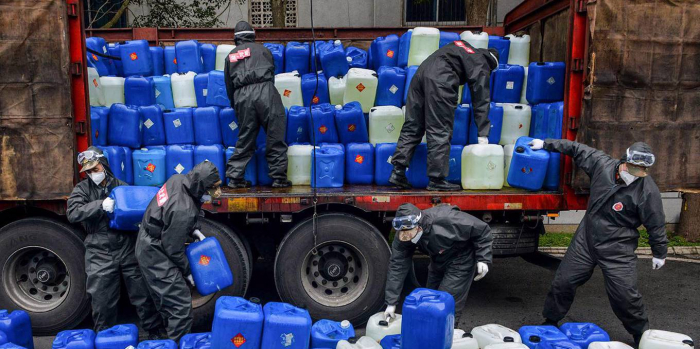No country is immune from the threat posed by COVID-19 and other fast-spreading viruses. In fact, climate change, increased global mobility, and demographic shifts are likely to increase the risks, uncertainties, and costs associated with similar outbreaks in the future.
The COVID-19 outbreak is threatening to become a global pandemic of the type not seen for a century. This new coronavirus has now spread to 77 countries, infecting over 93,000 people and killing more than 3,200; so far, 86% of cases and 93% of deaths have been in China, where the outbreak began. With the virus now having been identified on six continents, the World Health Organization has raised its threat assessment to its highest level. And Bill Gates, who previously has been vocal about the danger of a global pandemic, says COVID-19 “has started behaving a lot like the once-in-a-century pathogen we’ve been worried about.”
The outbreak quickly became a highly politicized topic. Senior WHO officials, for example, were criticized both for applauding the Chinese government’s efforts to contain the virus and for their own delay in declaring it an epidemic. Moreover, despite repeated calls for more resources to tackle the virus, the WHO has received only a small amount of the support pledged by the international community, forcing it to rely instead on its internal lending mechanisms. And at a time when governments should be taking coordinated action to contain the virus, many airlines have suspended flights to China, even though the WHO and the International Air Transport Association have not advised such a move.
The response to the Chinese government’s unprecedented and largely successful measures to contain the COVID-19 outbreak, including travel and movement restrictions within infection hotspots, has been mixed. While Western mainstream media have tended to describe the lockdown of Wuhan and other Chinese cities with a total population of about 60 million as “draconian,” former United Nations Secretary-General Ban Ki-moon expressed a supportive message for the bold and necessary measures.
By so far restricting the overwhelming majority of COVID-19 cases and deaths to Hubei province, the Chinese authorities have given the international community additional time to take precautionary measures. The heroes of China’s response, of course, are the frontline medical personnel who risked their lives – and, in some cases, died – to protect their fellow citizens.
COVID-19 is the fourth major virus outbreak since 2000. The 2002‒2003 severe acute respiratory syndrome (SARS) epidemic killed 774 people; the Middle East respiratory syndrome (MERS) spread to 27 countries, with 2,494 laboratory-confirmed cases and 858 deaths; and repeated Ebola outbreaks in the Democratic Republic of the Congo have so far resulted in 3,444 total cases and 2,264 deaths. (The death toll from the West African Ebola outbreak in 2014-2015 was far higher.)
Besides the deaths and significant psychological effects, COVID-19 also is causing major damage to the global economy by disrupting production and value chains in almost all industries. The outbreak is costing the global shipping industry $350 million per week, primarily owing to the slowdown in Chinese goods manufacturing. Global aviation demand has fallen significantly since the beginning of the year, with Asian carriers particularly hard hit: Cathay Pacific, for example, expects to scale back flights by 40% during the remainder of the first quarter. And many countries’ tourism and hospitality sectors have shrunk.
The COVID-19 contagion has spread to financial markets, with global stocks recently losing $6 trillion in value in six days – the sharpest decline since the 2008 financial crisis. The unexpected global economic slowdown, which comes at a time when growth is much needed, will affect both advanced and developing countries and raise fears of a global recession.
No country is immune from the threat posed by COVID-19 and other fast-spreading viruses. In fact, climate change, increased global mobility in business and tourism, and demographic shifts are likely to increase the risks, uncertainties, and costs associated with similar outbreaks in the future. Moreover, national health systems are underprepared to cope with this imminent global emergency.
A new global approach is therefore needed to deal with such crises. For starters, a swift response and international mobilization of resources and expertise are essential, together with sympathy and compassion. The Chinese people deserve the world’s moral support at this most difficult time. Events such as the COVID-19 outbreak should not be occasions for politicized responses: A sense of shared humanity must take precedence over politics when a disease threatens to become a pandemic.
In addition, policymakers should use technological advances (including artificial intelligence and biotechnology) for the betterment of our common future. As well as the introduction of improved early-warning systems, a renewed focus on research into prevention options such as vaccines is critical. Rather than leaving research and innovation to the profit-driven global pharmaceutical industry, governments should build national health systems that will put them in a stronger position to prevent and contain outbreaks. Finally, the WHO’s capability should be strengthened and its international emergency capacity expanded so that viruses can be fully contained where they originate.
COVID-19 is a sharp reminder that epidemics can quickly wipe out economic advances. Moreover, the difficulty of measuring the full impact of such outbreaks makes the global economy more vulnerable. Governments and international organizations therefore need to implement recovery measures that have the least negative economic impact, and support the poorer citizens and small firms that ultimately will be most affected by any outbreak. Above all, world leaders must refrain from political posturing and unite to defeat this deadly global threat.
Arkebe Oqubay, a senior minister and special adviser to the prime minister of Ethiopia, is a distinguished fellow at the Overseas Development Institute. His recent publications include Made in Africa, How Nations Learn, and The Oxford Handbook of Industrial Hubs and Economic Development.
Read the original article on project-syndicate.org.
More about: COVID-19
















































